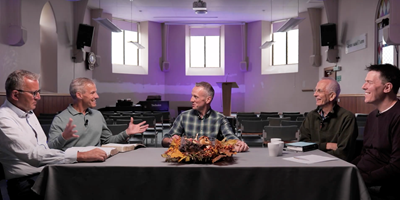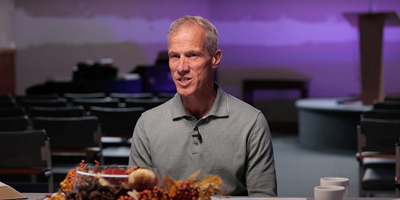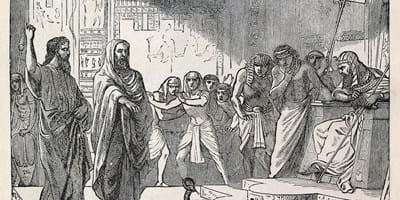The sad reality is that, although they do not want to sin, and their desire is to please their Father in heaven, Christians do sin.
When John wrote to fellow believers, he stated his purpose:
“My little children, these things I write to you, so that you may not sin” (1 John 2:1a).
However, John knew by experience that all Christians do sin, so he gave his readers a reassuring promise:
“And if anyone sins, we have an Advocate with the Father, Jesus Christ the righteous. And He Himself is the propitiation for our sins, and not for ours only but also for the whole world” (1 John 2:1b-2).
We have an Advocate
When Christians sin, they do not need to wonder how it will be viewed. They need not be distressed with the thought that they might be cast out from God’s family to never again enjoy fellowship with their Father.
This is not because their Father has changed His view on sin or will turn a blind eye to it. No, the reason we need not be anxious or distressed about the possibility of losing our family status is because “we have an Advocate”. An advocate is a legal term that means "one who will come to your side to help”. Notice that John does not say we need to appoint one or go searching for one, but we already have one.
The Christian’s advocate is Jesus Christ, the only one qualified to hold this position. It is one of many offices He holds. As our High Priest, He supplies grace to keep us from sinning when we are tempted but, if we do sin, as our Advocate He represents us before our Father.
The residence of our Advocate
It is helpful to know where our Advocate resides. Although we may correctly say “‘He is in heaven’”, John wants us to know that He is “with the Father”. Jesus Christ is said to be a High Priest before God (Hebrews 9:24), but He is our Advocate, not “with God the judge” but “with God the Father”.
In Scripture, individual words and phrases are important. In John 14:6b Jesus did not say, “No one comes to God except through Me” but “No one comes to the Father except through Me”. Everyone will come before God someday but only those who have trusted in the Lord Jesus can come to Him as their Father.
John encourages believers by reminding them that, even though they have sinned, the family relationship has not been broken. The love of God has been lavished upon those who have come to Him and know Him as their Father.
“Behold what manner of love the Father has bestowed on us, that we should be called children of God!” (1 John 3:1).
Every Christian is a “child of God” by redemption, adopted into His family. Nothing can change that status. As in physical life I will always be my father’s child, so spiritually I am my heavenly Father’s child. But just as in the physical realm there are times when the relationship is strained, so it is in the spiritual realm.
When I sin, I do not need judicial clearance; that has already been established. I have been justified by God through faith in Jesus Christ (Romans 5:1). Parental forgiveness is what I need so that fellowship might, once again, be enjoyed.
Let us not think that our Father is wanting to condemn us. Jesus Christ is an Advocate before a Father who is longing to forgive. Our Lord Jesus Christ does not need to somehow win for us love from God, but God cannot treat sin as if it were not sin. We need an effective advocate.
The character of our Advocate
If I were due to appear in a human court, I would want to be able to completely trust in the one who was going to represent me. My advocate would need to know all the intricacies of the law and not be outmanoeuvred by the prosecution. What is important on earth is infinitely more important in heaven.
Thankfully, the credentials of our heavenly Advocate are impeccable. He is a righteous Advocate and there is no one better qualified. As a man, He perfectly understands us. Having lived upon this earth, He knows the full force of external temptation. As He was without sin, He was always well-pleasing to the Father and they were and are always in perfect agreement.
As a righteous Advocate there are some noteworthy features of His work:
- He does not justify our sin.
- He does not excuse our sin.
- He does not deny that we have sinned.
- He does not seek to hide or minimise our sin.
As my sin is perfectly manifest, what does that mean? How can I know restoration and enjoy a relationship with my heavenly Father?
The work of our Advocate
The Christian’s advocate, Jesus Christ, continues to work. We can rightfully speak of the finished work of Christ but also of the unfinished work of Christ. He who completed one work when He died for our sin, began another when He ascended to our Father in heaven.
John wants us to know that “He Himself is the propitiation for our sins”.
The emphasis is on the person. The cross is not the propitiation, He is. Again, we can note the choice of words: “‘He is”, not “He was”. He is presently, as our Advocate, the propitiation for our sins.
Propitiation could be summarised with the often-sung phrase, “The wrath of God was satisfied”. Sin cannot be overlooked by a holy God. His just and righteous demands must be met. Propitiation is a term that is used for the satisfaction of the offended holiness and wrath of God. In many religions, it is the worshipper, not the god, who is responsible to appease the wrath of the offended deity. But the marvellous proclamation of Christianity is that God, in His love, has made that provision for humanity.
“In this is love, not that we loved God, but that He loved us and sent His Son to be the propitiation for our sins” (1 John 4:10).
Propitiation has reference to persons; God is propitiated by the sacrifice of His Son on the cross. The only part that Christians have in propitiation is to enjoy its blessings. A once and for all sacrifice has ongoing eternal blessings for God’s people. All those sins that we commit, despite striving to avoid them, are completely and perfectly dealt with by the work of Jesus Christ at Calvary’s cross.
Christ's death satisfied the demands of God's wrath. His death continues to satisfy; it never needs repeating. There is no “expiry date”. John wants us to know that.
Some Advocates may work for free, but not many. Our Advocate has paid an enormous price that we might be forgiven and know fellowship with our Father. Whenever we sin, we can know this:
Our righteous advocate, Jesus Christ, is with our heavenly Father pointing to the work He completed on the cross.
































